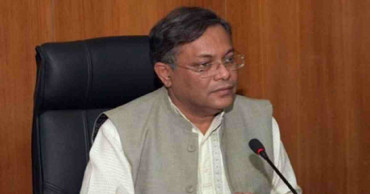Fuel crisis
Sylhet fuel traders declare indefinite strike from Jan 18
In light of the current fuel crisis, Sylhet's fuel traders will go on an indefinite strike from Wednesday.
Sylhet Divisional Committee of Bangladesh Petroleum Dealers, Distributors, Agents, and Petroleum Owners Association has announced the indefinite strike after an emergency meeting on Saturday.
According to their decision, traders will cease purchasing from the depot beginning next Wednesday (January 18) and cease selling to consumers from the following Sunday (January 22) for an indefinite period.
“The supply of fuel has long fallen short of the demand. The Sylhet oil traders have no choice but to protest,” said the speakers in the meeting.
According to Sylhet fuel traders, the district's oil pumps have been running low on fuel for a long time due to the irregular movement of railway wagons from Chattagram to Sylhet.
Previously, condensate (a mixture of light liquid hydrocarbons) obtained from Sylhet's gas fields was converted to petrol in multiple Sylhet plants. Since these government-owned plants were shut down, the condensate is now converted to petrol in Chittagong by a private plant.
The district's fuel traders claimed that depot officials' inaction caused the crisis.
"Authorities have repeatedly failed to supply fuel oil. They're just making excuses, and traders are suffering severe losses as a result. That is why we called a strike," said Jubaer Ahmed Chowdhury, Central Secretary General and President of Sylhet Divisional Committee.
Jubaer along with Humayun Ahmed, General Secretary, made the announcement.
3 years ago
Not enough fuel allocation means no ambulance service at Faridpur General Hospital for 45 days
Biman Dutta, a resident of Faridpur town, was at a loss when he needed to shift his father-in-law from Faridpur General Hospital to Bangabandhu Sheikh Mujib Medical College and Hospital (BSMMCH) in the district due to critical condition.
As there was no ambulance service at the hospital for over 45 days due to “fuel crisis”, he had to hire a private ambulance that cost him twice as much.
Many patients from Faridpur town and adjacent upazilas are facing the same problem due to ambulance shortage as critical patients need to be transferred to BSMMCH and Dhaka for advanced treatment.
Read more: Inmates at overcrowded Faridpur jail suffer in absence of medical facilities
The hospital authorities are saying this problem has been caused by lack of fuel being allocated.
They said they have sent numerous letters to the Directorate General of Health Services (DGHS) and the Ministry of Health seeking funds but are yet to get any response.
“Lack of fuel allocation is to blame for patients’ suffering. We owe the local petrol station around TK 3.5 lakh for fuel. We had to halt our ambulance service from November 1, 2022,” said Ganesh Kumar Agarwala, resident medical officer of the hospital.
3 years ago
Govt working to revise renewable energy policy: Recent primary fuels crisis a reason
The government is working to revise the “Renewable Energy Policy of Bangladesh 2008” to make it more effective in the changed energy and power sector scenario.
Official sources said, Sustainable and Renewable Energy Development Authority (Sreda), the focal organization under Power Division of the government, has already appointed a consultant.
The consultant – Development Technical Consultants Pvt. Ltd (DTCL) – has started reviewing the existing renewable energy policy, REPB-2008, and organize focus group discussion for stakeholders.
Read:Govt deliberately pursuing import-dependent energy policy: Speakers
According to renewable energy industry insiders, the first meeting of the stakeholders will be held on September 20 in Sreda office.
The consultant firm convened the meeting on behalf of Sreda where it will make a presentation on the existing policy and seek opinions of the stakeholders to update it in a national and global changed scenario, said an industry insider.
He said the initiative have come from the government as a follow-up of its statements to 26th meeting of the United Nations Climate Change Conference (COP26), held in Scotland, United Kingdom, from October 31 to November 13 2021.
Read: Experts for reining in energy corruption, exploration of alternative sources
In the COP26 meeting, Bangladesh Prime Minister Sheikh Hasina in written statement said: “We are also working for a more sustainable energy mix. We hope to have 40% of our energy from renewable sources by 2041”.
She also said, “Recently we submitted an ambitious and updated NDC (Nationally Determined Contributions) to the UNFCCC. We have cancelled 10 coal-based power plants worth 12 billion dollars of foreign investment.
Currently, as per Sreda statistics, the country generates about 911 MW (solar 677 MW, hydro 230 MW and others 2 MW) while the total power generation is more than 25,000 MW which shows the renewable energy’s share is less than 4 percent.
Read: Patience can help overcome crisis in energy sector: Nasrul
The recent crisis in primary fuels is another reason behind the move, said a Sreda official.
State Minister for Power, Energy and Mineral Resources Nasrul Hamid, recently at a function, said that among other options of renewable energy, solar power has huge potential for Bangladesh. But since it requires substantial land allocation, it needs an innovative solution.
He also said Bangladesh is now promoting the options of rooftop and floating solar panels and net metering system has been introduced to popularise the use of solar power.
Read Huawei Technologies intends to support RMG industry in renewable energy
“There is a good opportunity to work on wind power as well,” he said, adding that wind mapping has been completed for 9 potential sites and feasibility will be conducted on the potential for offshore wind power.
Private investors in renewable energy sector welcomed the Sreda initiative to review the renewable energy policy and bring necessary amendments to promote non-conventional energy sources.
Dipal Barua, president of Bangladesh Solar and Renewable Energy Association (BSREA), termed the initiative “time befitting.”
Read TEI GET to promote renewable energy in Bangladesh
He said despite a huge potential, the country could not utilize it due to lack of proper action plan.
Munawar Moin, Vice President of BSREA and President of Solar Module Manufacturers Association of Bangladesh (SMAB), said the government should introduce a policy under which the local solar industry could utilise their full potentials.
Cost of solar energy decreased substantially and has created a huge scope for investment in mega projects, he said.
Read Green Economy in Bangladesh: Prospects and Challenges
3 years ago
Cry for fuel, electricity is a global reality: Hasan Mahmud
Information and Broadcasting Minister Hasan Mahmud on Sunday said power and fuel shortage has hit even the developed countries, not only Bangladesh.
The minister made the remark replying to a journalist’s question on BNP blaming load shedding and price hike in the country on the government’s corruption.
He said a country like Germany where power cut didn’t occur even for once after the Second World War has asked the people to ration electricity and use cold water instead.
He further said the US government has sent sms to public for maintaining austerity in power usage.
France and Australia are conducting daily load shedding for two hours while the Spanish prime minister has urged people not wear tie amid heat, claimed Hasan.
Read: Media should not publish unverified news: Hasan Mahmud
“The whole world is maintaining austerity in power usage as price of fuel used for electricity production has increased,” he said. “Price of LNG has increased tenfold,” he added.
He said Bangladesh is rationing electricity like the developed countries are doing but “We are hopeful by December the crisis will be over. BNP understands all these yet they make such accusations,” said Hasan.
About BNP’s remark on knocking off AL government through movement, the minister said, BNP failed to do so in the past.
“Trying again BNP will fall on the face and might crack their head,” he warned.
3 years ago
Imported Indian crude oil reaches Narsingdi amid fuel crisis
The maiden shipment of 25 lakh litres of crude oil imported from India reached the country on Saturday, aiming to tackle the ongoing fuel crisis.
Representatives of Bangladesh and India formally released the crude oil at Aqua Refinery jetty in Gorashal of Narsingdi in the morning.
Private company Aqua Refinery Limited imported Naphtha (crude oil) from Indian Oil Corporation Limited through Indo-Bangladesh Inland Waterways Protocol Route.
Bangladesh Inland Water Transport Authority (BIWTA) director Rafiqul Islam, Indian Oil Corporation Limited Bangladesh country manager Mazhar Alam, Aqua Refinery Limited director operation Ershad Hossain, Shanghai ship owner Masudur Rahman, Aqua Refinery deputy managing director Sajedul Siraj, general manager GM Jahangir Alam, among others, were present at that time.
Read: Fuel crisis hits filling stations in Thakurgaon
After the refining process by Aqua Refinery, Bangladesh Petroleum Corporation (BPC) will buy the crude oil and provide it to the consumer level within one week.
Amid the unprecedented situation due to fuel crisis, the government recently announced suspension of production in diesel-run power plants. It resorted to one –hour area based load shedding across the country to save energy.
The government has also taken some austerity measures including reducing consumption of power at government offices to save power and energy.
3 years ago
Enough petrol in reserve, no chance of crisis: EMRD
There is no chance of a fuel crisis in Bangladesh as the country has enough petroleum in reserve, the Energy and Mineral Resource Division said Monday.
The Bangladesh Petroleum Corporation has been ensuring an uninterrupted supply of petroleum oil across the country through its subsidiary oil marketing companies, the EMRD said in a statement.
The statement came against the backdrop of the recent media reports about a fuel crisis in the country's northern districts.
Petroleum is supplied from Daulatpur in Khulna to Parbatipur and from Chattogram to Rangpur by rail wagon.
Despite having adequate stock in the country, the supply of octane and petrol to the depots in some of the northern districts was delayed due to a shortage of railway engines as the railway gave priority to passenger transport during Eid-ul-Fitr, the energy division said.
"The supply of octane and petrol is now stable across the country. Stocks and supply of other fuel oil also remain normal," the energy division said, adding that legal action will be taken against anyone who will sell octane and petrol at an inflated price falsely citing the energy crisis.
The division urged people not to buy octane and petrol at excess price.
To meet the demand for fuel oil in the country, the import schedule of octane has been finalised as per the monthly requirement for May and June.
Fuel tankers are plying the Chattogram Port every week. Production of octane and petrol has continued at the state-owned Eastern Refinery and private plants.
The average monthly demand for octane and petrol in the country is around 36,000 metric tonnes and 39,000 metric tonnes respectively.
This demand can be met with existing stock, import, and domestic production, said the energy division.
Also read: BPC incurs Tk 63 crore loss a day in petroleum sale, but experts suggest cut on import duty
3 years ago





.jpg)



